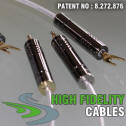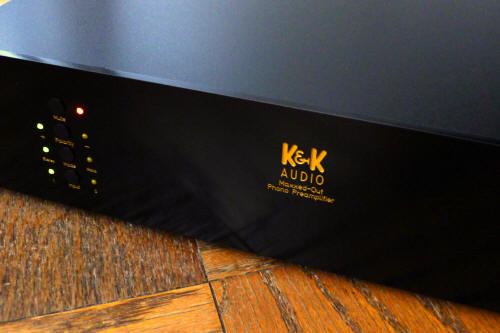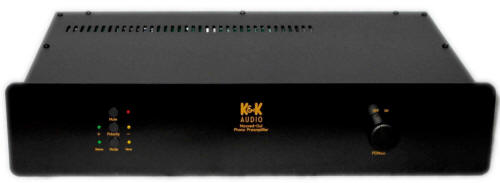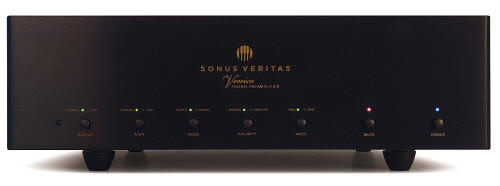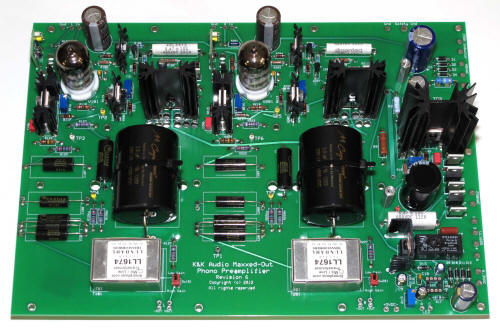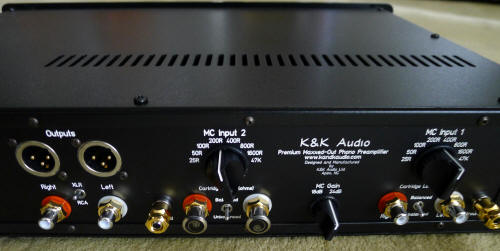|
|
You are reading the older HTML site
Positive Feedback ISSUE 77
k&k audio Premium Maxxed-Out Phono Preamplifier as reviewed by Marshall Nack
Some products are disarmingly ingratiating. It's possible that attraction can be subversive, so pleasing that you let your guard drop, and thus allow potential issues to slip by undetected. That's certainly an apt description of the product at hand, for the K&K Audio Premium Maxxed-Out Phono Preamp is nothing if not a sweet talker.
Vintage Recordings There were times when I thought the K&K strayed too far from moderation. Take, for example, Byrd at The Gate (Riverside RS 9467), with the Charlie Byrd Trio and trumpet player Clark Terry guesting on a couple of tracks.
Regardless of the phono stage I was using, it has always been obvious that Charlie was playing an acoustic guitar for the date, and most likely it had nylon strings. It is not twangy in a country-music style. Transients do not throw off bright treble flecks; they hit in the midrange and then merge into the sustain of the note. Through the K&K, the guitar sounds a bit darker and weightier. Timbre, frequency integration and coherency are maximal and the recording venue is clearly resolved on a 3-D stage. The instruments are rather large and full-bodied, located left, right and center in stable positions. At the end of a tune occasional applause comes from some place behind the musicians. Decidedly acoustic, it wholly escapes the trappings of analytic sound—or solid-state, for that matter. And it sure doesn't resemble digital. The K&K Premium Maxxed-Out Phono is the digital antidote. The quality of the sound reminds me of amps employing the 845 power tube. But it does have an aura of vintage about it—a warm, tubey veneer. Then again, this is an original pressing of a live recording made at The Village Gate in 1963 when tubes were omnipresent. This vintage aura was present on a variety of original pressings I played. Modern Recordings
I figured I better move away from vintage, and so I cued up Antonio Lysy at the Broad, a Grammy Award winning LP recorded in 2009 (Yarlung Records), and a splendid example of how analog can sound with 21st-century recording tools and producers who are both musically astute and audiophiles. It is terrific! The LP entered my rotation immediately upon acquisition and stayed there. The piano introduces Alberto Ginastera's "Triste" with delicate, filigree triplets. The notes linger, decaying leisurely (the damping pedal is not engaged). The image of the instrument's wooden case has materialized before you. The cello makes its entrance with a series of treble harmonics otherworldly in their delicacy. The instrument is speaking to you, the listener, and a song is realized. On both LPs there's no doubt about the presence of step-up transformers in the loop, heard in the ebb and flow of the dynamic and harmonic relationships of the instruments. Speed is good, with fast moving transients, rhythm and timing are very well done, the noise level is very low, and the purity quotient is high. Tone and timbre are voluptuous. Frankly, the sound is gorgeous, sweet and beguiling and easy on the ear. These are key components of the K&Ks ingratiating manner. And, no, the Yarlung LP does not sound old-timey. The vintage character of the Riverside was true to the recording. As panel-mate Sheldon expressed it, "The K&K glosses over its mistakes by being so musical." Yes, I would agree and, yes, I felt disarmed. But when I went looking for mistakes, I came up nearly empty handed and the longer I listened to it, the fewer critiques remained. My opinion evolved as I clocked long hours. (See Burn-In paragraph below.) You are not supposed to get this kind of performance from a $4449 phono stage. Only when I swapped in the much more expensive Audionet PAM G2 Phono did I become aware of what was missing. Exciting and Relaxed In the first listening session with the panel, one of the newer members, Abe, started talking right away about micro-level details being highlighted, how the K&K showcased the amazing technical ability of the players and brought little details of the performance to the fore. Abe thought this highlighting was attractive enough but deviated from natural. Yet, at the same time, everyone noted how comfortable it was to listen to, how "not in your face." The K&K presented a conundrum. Later on I came across this link to an online post by the designer comparing sound differences related to newly installed silver wire transformers in place of the copper wire ones: "…music listened to through the LL1931Ag [silver wire transformers] is more relaxed and yet, at the same time, more exciting due to the perception of more contrast between subtle details. I didn't hear this as darkness, but as a lower distortion result, where smaller contrasts were more apparent…" Yes, the silver wire transformers (an optional upgrade from the standard copper wire ones that'll run you $800 each and two are needed) do something interesting in the upper mid through treble range.
The ALLNIC H-3000V That is not the way my reference Allnic H-3000V Phono Preamp reproduces these details. The Allnic actually throws more inner detail, but it does so in a humble manner, never calling attention to itself. The info is there but, unlike the K&K, it is not dramatized and, in that sense, it is not thrust at you. If you want it, you have to go and get it. The Allnic was carefully selected as my reference after auditioning many competing products. Its strong suit is how natural it sounds. It takes coherency to another level, so it's truly more of a single piece of cloth from top to bottom. It is an all-tube component that doesn't emphasize its topology and doesn't sound like Hi-Fi. (MSRP is around $15K.) Note that after this short discussion this highlighting critique receded and did not come up again. It's something you can easily get used to. Which one is more exciting? The K&K. Dynamics Let's shift focus to dynamics. Expectations are so-so for a tube-hybrid, step-up design at $4449 MSRP. So I was pleasantly surprised when those big crescendos came along and the K&K did not fall down. Mind you, it ain't the nearly limitless headroom of much higher-priced units, like the Vitus SP-102, the Soulution 720 line stage with its built-in phono, or the Ypsilon VPS-100. Or even like Kevin's last phono stage project, the Sonus Veritas Venice. (The Venice was an attempt at an all-out phono stage, priced around $20K. Alas, it seems the Sonus Veritas brand never made it in the consumer marketplace.) The hybrid Venice was a similar design employing coupling transformers on input and output with many more valves in the circuit. It had that best-of-breed macro performance and also excellent control of the low-end.
The K&K macro performance is not in that league. My surprise had to do with its clean and distortion free peaks, which did not breakup or flatten—they just didn't expand as much. Still, this is remarkable. I can't recall encountering relatively compression- and distortion-free macro performance in a component anywhere near this price point. Maybe it employs some form of soft clipping? Furthermore, because the K&K tonal balance is so weighty, the unit throws plenty of slam. Bass goes very low and is plentiful. The issue here is it could be tighter. This is the one area of concern I have: low-end control. The lower frequencies are a little murky and this impacts resolution. It gets more problematic as SPL goes up. Ultimate resolution escapes the K&K. The Pedigree The K&K Audio Premium Maxxed-Out Phono Preamp is the latest in a long line of phono preamps designed by Kevin Carter. My first encounter was many years ago with the Vinyl Reference, marketed by Art Audio. This mid-price phono stage was enthusiastically received by consumers and reviewers alike, including yours truly, and in due course, landed on Stereophile's Recommended Components listing. Art Audio dropped the product in 2009. Sometime afterwards, Kevin and a partner established Sonus Veritas with the much more ambitious mandate to bring cost-no-object components to market. The Sonus Veritas Venice was a significant entry at the $20K price point. Now it seems Sonus Veritas has gone to sleep. Throughout it all Kevin has maintained his own company, K&K Audio, whose principal business is importing Lundahl Transformers and marketing his own line of audio kits under the K&K brand name. So we come to the K&K Audio Premium Maxxed-Out Phono Preamp. K&K offers two phono stage models for the DIYer: the recently introduced Trio Phono Preamplifier and the more sonically and electrically sophisticated Premium Maxxed-Out Phono Preamp. You can add part and feature upgrades from a menu priced à la carte. And if you are lazy or all thumbs, Kevin will assemble it for you for a slight up-charge. (Late breaking news: Kevin recently decided not to offer the Premium Maxxed-Out Phono Preamp as a kit. It is now only available fully assembled.) Each unit is configured for an individual consumer. Cosmetics and Features The Premium Maxxed-Out Phono reviewed here arrived ready to plug-n-play and was configured to my specs with all of the premium goodies. It has two MC inputs, each with independent gain, loading controls and its own ground post. (Useful features if you're running multiple turntables or tonearms.) The matte black aluminum chassis with green indicator diodes is conventional—no; make that retro—in appearance. It looks old fashioned, the kind of no-frills black box that you might find from many small manufacturers. Nowadays, everyone is into blue diodes and a silver chassis. Smallish and light-weight at 24 lbs., it will not call attention to itself on your rack. Build quality is good. The K&K is easy to use. All the needed features and controls are accessible from either the front or rear panel. However, there is no remote. The front panel has Input, Mute, Polarity and a handy Stereo/Mono switch. Everything operated securely and functioned without issue. There are two Russian type 6N23P (or 6N23P-EV) tubes on the input amplification stage. These are NOS, usually from the 1970s, and imported directly by K&K.
Installation All cabling—both balanced and single-ended ICs and power cord—were Elation! from Kubala-Sosna. I had a variety of gear in over the review period. Turntables were either the Dr. Feickert Firebird or Kronos Sparta, Preamps were my Trinity or Audionet PRE G2, and the amplifier was the Audionet MAX monoblocks. At normal volume settings and with the tonearm lifted, there was no audible sound from the listening seat. Daily warm-up: give it a good ½ hour with signal. I liked to give it two LP sides before critical listening.
PHOTO: rear Cartridge Loading and Burn-In Kevin is customer-focused and likes to burn-in units before shipping. Mine arrived with 150 hours on it, which he said got you 90% of the way there. That number of hours is usually sufficient, so I went right to listening. I began with the K&K set to 400R, the recommended loading for my Air Tight PC1s MC cartridge. It was way too dark. Even at 800 it was dark. I wound up at 1600. This was not a happy beginning. It got better. After the unit had clocked another 25 hours, I revisited loading. Now when I switched back to 800 it was an improvement across the board. The sound had changed, the treble was coming in. Who knows…? After another 25 hours, I tried it again. End of story, I'm using 400 with great results. Play around with cartridge loading and don't skimp the burn-in. Conclusion When you come upon a sympatico designer, the smart thing to do is follow his footsteps. First stop was the Vinyl Reference Phono Preamp, formerly marketed by Art Audio. In the course of my review I interviewed the designer and we clicked on things musical. Next was the Venice Phono Preamp from Sonus Veritas. And now there's the K&K Audio Premium Maxxed-Out Phono Preamp. I've had the good fortune to try them all and I dare say the voicing has been constant throughout. It is not the sound of modern analog, which tries to incorporate the best aspects of digital playback. (And has come increasingly to resemble it.) It recalls the analog we grew up with (those of us of a certain age). The K&K is like going home again to a comfortable, familiar sound. This little chassis with its little price pushes all the right buttons, from timbre and tone to dynamics and soundstaging and is delightfully ingratiating, satisfying all listeners. At this price point, I can guarantee you won't find better. And, based on a lot of experience, I can tell you it won't be easy to match even for $10K. The K&K Audio Premium Maxxed-Out Phono Preamp is a stealth product hovering under the radar and a true High End bargain. Marshall Nack
Premium Maxxed-Out Phono Preamp Manufacturer info:
K&K Audio |







